|
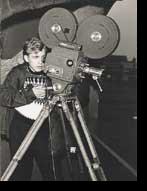
HARRISON ENGLE
DIRECTOR / PRODUCER
BIOGRAPHY
Harrison
Engle has always loved the challenges of filmmaking. He
has directed and produced more than eighty
productions, and filmed in thirty states, Canada, 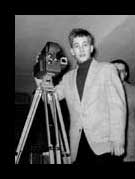 the Caribbean and abroad. Known for his creative
vision and versatility, he has sought out quality projects that express
his wide-ranging interests. Born in Washington, D.C., Harrison grew up
in Detroit, Michigan. His father was an automobile executive and
entrepreneur, and his mother instilled in him an appreciation of the
arts. Harrison appeared professionally as a young magician and actor on
stage, radio and television. Starting with the family 8mm camera, he
began making films at 11. He made a variety of films before twenty,
including animation, comedies, dramas and documentaries. A
performing arts major at famed Cass Technical High School, he graduated
in communications from Wayne State University. the Caribbean and abroad. Known for his creative
vision and versatility, he has sought out quality projects that express
his wide-ranging interests. Born in Washington, D.C., Harrison grew up
in Detroit, Michigan. His father was an automobile executive and
entrepreneur, and his mother instilled in him an appreciation of the
arts. Harrison appeared professionally as a young magician and actor on
stage, radio and television. Starting with the family 8mm camera, he
began making films at 11. He made a variety of films before twenty,
including animation, comedies, dramas and documentaries. A
performing arts major at famed Cass Technical High School, he graduated
in communications from Wayne State University.
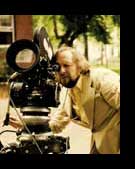
Harrison received
an MFA in Film from Columbia University. In New York, he directed
off-Broadway theater, radio plays such as Lanford Wilson’s
This is the Rill Speaking, and dramatic shorts. His comedy
short, Railroaded, includes the first film score
composed by Philip Glass. His dance short, Sun Dance,
is in the Dance Film Collection at Lincoln Center. Honing
his craft, Engle was a cinematographer for the BBC and editor for
CBS network. He worked with documentarian Willard Van Dyke,
with wide-screen filmmaker Francis Thompson, and with renowned
television producer Robert Saudek (“Omnibus”).
In Los Angeles in
the 80's and 90's, Harrison directed a series of critically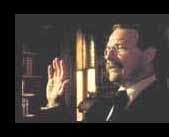 acclaimed documentaries and dramatic films. He achieved
national success with his feature documentary, The
Indomitable Teddy Roosevelt. Premiering on ABC in 1986 in prime
time, sponsored by AT&T, the fi acclaimed documentaries and dramatic films. He achieved
national success with his feature documentary, The
Indomitable Teddy Roosevelt. Premiering on ABC in 1986 in prime
time, sponsored by AT&T, the fi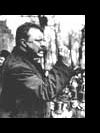 lm has uniquely been
shown on three networks. Screened at many festivals, it is
regarded as a classic for its rousing score and its creative and
influential mix of historic footage and artful recreations. Reviewers
praised the quality of the directing, writing, editing and archival
footage. “Extraordinary, moving, magnificent!” said Tom Shales, critic
for the Washington Post. “The two-hour program is a stunner…the product
of inspired direction by Harrison Engle,” said Howard Rosenberg in the
Los Angeles Times. The program was named “one of the best programs of
the year” by The New York Times. lm has uniquely been
shown on three networks. Screened at many festivals, it is
regarded as a classic for its rousing score and its creative and
influential mix of historic footage and artful recreations. Reviewers
praised the quality of the directing, writing, editing and archival
footage. “Extraordinary, moving, magnificent!” said Tom Shales, critic
for the Washington Post. “The two-hour program is a stunner…the product
of inspired direction by Harrison Engle,” said Howard Rosenberg in the
Los Angeles Times. The program was named “one of the best programs of
the year” by The New York Times.
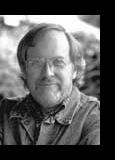 Harrison’s affinity for music was further seen in his documentary,
Benny Carter: Symphony in Riffs, which was named
“Jazz Movie of the Year” by the Los Angeles Times. Engle was also a
production executive on the motion picture DA, starring
Martin Sheen, which was shot in Ireland and produced by FilmDallas
Pictures. He created tributes for seven Academy
Awards telecasts, honoring industry legends such as James
Stewart, Billy Wilder and George Lucas (narrated by Steven Spielberg.)
For the American Film Institute, he supervised the theatrical feature
America at the Movies, and co-executive produced three AFI Life Achievement
Award Specials on CBS.
Harrison’s affinity for music was further seen in his documentary,
Benny Carter: Symphony in Riffs, which was named
“Jazz Movie of the Year” by the Los Angeles Times. Engle was also a
production executive on the motion picture DA, starring
Martin Sheen, which was shot in Ireland and produced by FilmDallas
Pictures. He created tributes for seven Academy
Awards telecasts, honoring industry legends such as James
Stewart, Billy Wilder and George Lucas (narrated by Steven Spielberg.)
For the American Film Institute, he supervised the theatrical feature
America at the Movies, and co-executive produced three AFI Life Achievement
Award Specials on CBS.
In 1998, he
directed the historical feature The Legend of Two-Path.
The elaborate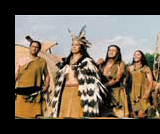 production has a cast of 40 and was filmed on
location at Roanoak Island, North Carolina and at studios in
Winston-Salem. Other television documentaries include War and
Peace, a look at the great war films narrated by James Woods
("AFI's 100 Years…100 Movies," TNT), Future Flight,
about visionary deep space voyages hosted by Christopher Reeve
(Discovery), and Pillar of Fire, a two-hour history of
the founding of Israel narrated by Jason Robards (TNT). production has a cast of 40 and was filmed on
location at Roanoak Island, North Carolina and at studios in
Winston-Salem. Other television documentaries include War and
Peace, a look at the great war films narrated by James Woods
("AFI's 100 Years…100 Movies," TNT), Future Flight,
about visionary deep space voyages hosted by Christopher Reeve
(Discovery), and Pillar of Fire, a two-hour history of
the founding of Israel narrated by Jason Robards (TNT).
Harrison Engle is
a member of the Directors Guild of America. He is past
president of the In ternational Documentary Association,
where he founded the IDA Awards, served as publisher of
their magazine, Documentary, and chaired the first
International Documentary Congress, hosted by Walter Cronkite. He
also designed the organization’s motion logo. Harrison has served on
media arts panels for the National Endowment for the Humanities and the
Rockefeller Foundation. He has lectured on film at USC, UCLA, North
Carolina School of the Arts and other schools, and written articles for
publications such as Film Comment. In 2004-5, he was
faculty for the Harold Lloyd Master Seminars at the American
Film Institute, which presented such noted filmmakers as Alexander
Payne (Sideways), Taylor Hackford (Ray), and
Charlie Kaufman (Eternal Sunshine of the Spotless Mind). ternational Documentary Association,
where he founded the IDA Awards, served as publisher of
their magazine, Documentary, and chaired the first
International Documentary Congress, hosted by Walter Cronkite. He
also designed the organization’s motion logo. Harrison has served on
media arts panels for the National Endowment for the Humanities and the
Rockefeller Foundation. He has lectured on film at USC, UCLA, North
Carolina School of the Arts and other schools, and written articles for
publications such as Film Comment. In 2004-5, he was
faculty for the Harold Lloyd Master Seminars at the American
Film Institute, which presented such noted filmmakers as Alexander
Payne (Sideways), Taylor Hackford (Ray), and
Charlie Kaufman (Eternal Sunshine of the Spotless Mind).
Today, Harrison
enjoys the process of filmmaking more than ever. “I love to find a
story that illuminates the human condition,” he says, “and then to use
the most artistic and dramatic ways to put that story on screen. It’s a
joy to reach and touch an audience.”
Up
|


 the Caribbean and abroad. Known for his creative
vision and versatility, he has sought out quality projects that express
his wide-ranging interests. Born in Washington, D.C., Harrison grew up
in Detroit, Michigan. His father was an automobile executive and
entrepreneur, and his mother instilled in him an appreciation of the
arts. Harrison appeared professionally as a young magician and actor on
stage, radio and television. Starting with the family 8mm camera, he
began making films at 11. He made a variety of films before twenty,
including animation, comedies, dramas and documentaries. A
performing arts major at famed Cass Technical High School, he graduated
in communications from Wayne State University.
the Caribbean and abroad. Known for his creative
vision and versatility, he has sought out quality projects that express
his wide-ranging interests. Born in Washington, D.C., Harrison grew up
in Detroit, Michigan. His father was an automobile executive and
entrepreneur, and his mother instilled in him an appreciation of the
arts. Harrison appeared professionally as a young magician and actor on
stage, radio and television. Starting with the family 8mm camera, he
began making films at 11. He made a variety of films before twenty,
including animation, comedies, dramas and documentaries. A
performing arts major at famed Cass Technical High School, he graduated
in communications from Wayne State University.  acclaimed documentaries and dramatic films. He achieved
national success with his feature documentary, The
Indomitable Teddy Roosevelt. Premiering on ABC in 1986 in prime
time, sponsored by AT&T, the fi
acclaimed documentaries and dramatic films. He achieved
national success with his feature documentary, The
Indomitable Teddy Roosevelt. Premiering on ABC in 1986 in prime
time, sponsored by AT&T, the fi lm has uniquely been
shown on three networks. Screened at many festivals, it is
regarded as a classic for its rousing score and its creative and
influential mix of historic footage and artful recreations. Reviewers
praised the quality of the directing, writing, editing and archival
footage. “Extraordinary, moving, magnificent!” said Tom Shales, critic
for the Washington Post. “The two-hour program is a stunner…the product
of inspired direction by Harrison Engle,” said Howard Rosenberg in the
Los Angeles Times. The program was named “one of the best programs of
the year” by The New York Times.
lm has uniquely been
shown on three networks. Screened at many festivals, it is
regarded as a classic for its rousing score and its creative and
influential mix of historic footage and artful recreations. Reviewers
praised the quality of the directing, writing, editing and archival
footage. “Extraordinary, moving, magnificent!” said Tom Shales, critic
for the Washington Post. “The two-hour program is a stunner…the product
of inspired direction by Harrison Engle,” said Howard Rosenberg in the
Los Angeles Times. The program was named “one of the best programs of
the year” by The New York Times.  Harrison’s affinity for music was further seen in his documentary,
Benny Carter: Symphony in Riffs, which was named
“Jazz Movie of the Year” by the Los Angeles Times. Engle was also a
production executive on the motion picture DA, starring
Martin Sheen, which was shot in Ireland and produced by FilmDallas
Pictures. He created tributes for seven Academy
Awards telecasts, honoring industry legends such as James
Stewart, Billy Wilder and George Lucas (narrated by Steven Spielberg.)
For the American Film Institute, he supervised the theatrical feature
America at the Movies, and co-executive produced three AFI Life Achievement
Award Specials on CBS.
Harrison’s affinity for music was further seen in his documentary,
Benny Carter: Symphony in Riffs, which was named
“Jazz Movie of the Year” by the Los Angeles Times. Engle was also a
production executive on the motion picture DA, starring
Martin Sheen, which was shot in Ireland and produced by FilmDallas
Pictures. He created tributes for seven Academy
Awards telecasts, honoring industry legends such as James
Stewart, Billy Wilder and George Lucas (narrated by Steven Spielberg.)
For the American Film Institute, he supervised the theatrical feature
America at the Movies, and co-executive produced three AFI Life Achievement
Award Specials on CBS.  production has a cast of 40 and was filmed on
location at Roanoak Island, North Carolina and at studios in
Winston-Salem. Other television documentaries include War and
Peace, a look at the great war films narrated by James Woods
("AFI's 100 Years…100 Movies," TNT), Future Flight,
about visionary deep space voyages hosted by Christopher Reeve
(Discovery), and Pillar of Fire, a two-hour history of
the founding of Israel narrated by Jason Robards (TNT).
production has a cast of 40 and was filmed on
location at Roanoak Island, North Carolina and at studios in
Winston-Salem. Other television documentaries include War and
Peace, a look at the great war films narrated by James Woods
("AFI's 100 Years…100 Movies," TNT), Future Flight,
about visionary deep space voyages hosted by Christopher Reeve
(Discovery), and Pillar of Fire, a two-hour history of
the founding of Israel narrated by Jason Robards (TNT). ternational Documentary Association,
where he founded the IDA Awards, served as publisher of
their magazine, Documentary, and chaired the first
International Documentary Congress, hosted by Walter Cronkite. He
also designed the organization’s motion logo. Harrison has served on
media arts panels for the National Endowment for the Humanities and the
Rockefeller Foundation. He has lectured on film at USC, UCLA, North
Carolina School of the Arts and other schools, and written articles for
publications such as Film Comment. In 2004-5, he was
faculty for the Harold Lloyd Master Seminars at the American
Film Institute, which presented such noted filmmakers as Alexander
Payne (Sideways), Taylor Hackford (Ray), and
Charlie Kaufman (Eternal Sunshine of the Spotless Mind).
ternational Documentary Association,
where he founded the IDA Awards, served as publisher of
their magazine, Documentary, and chaired the first
International Documentary Congress, hosted by Walter Cronkite. He
also designed the organization’s motion logo. Harrison has served on
media arts panels for the National Endowment for the Humanities and the
Rockefeller Foundation. He has lectured on film at USC, UCLA, North
Carolina School of the Arts and other schools, and written articles for
publications such as Film Comment. In 2004-5, he was
faculty for the Harold Lloyd Master Seminars at the American
Film Institute, which presented such noted filmmakers as Alexander
Payne (Sideways), Taylor Hackford (Ray), and
Charlie Kaufman (Eternal Sunshine of the Spotless Mind).